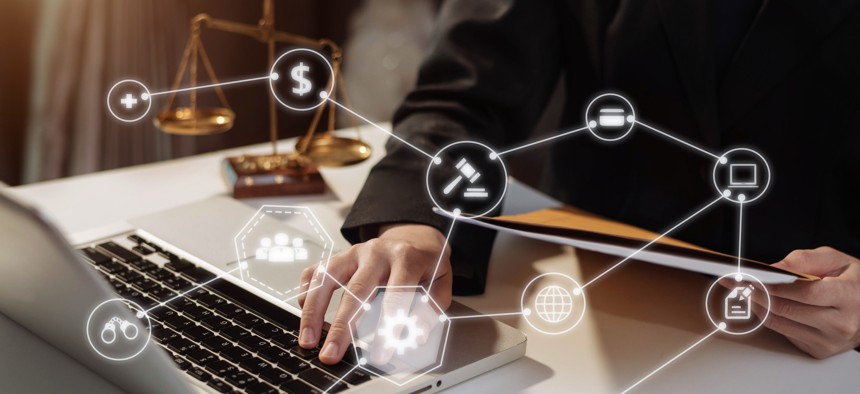NJ Courts’ IT modernization streamlines processes for staff, litigants

Thicha Satapitanon / EyeEm via Getty Images
The pandemic helped New Jersey Courts modernize its processes and technology, which helped the state’s legal system become more open, equitable and efficient.
When COVID hit in early 2020, New Jersey Courts spent several frantic weeks shifting to online operations. Now, many of the digital and process transformation measures that the New Jersey judiciary put in place during that early scramble have a permanent role to play, both in how it administers justice as well as reducing the nerve-wracking ordeal of going to court.
For the past two years, New Jersey Courts used technology not only to stay open but improve participation, increase security and help users resolve disputes more efficiently. The courts’ security foundation now includes threat detection, network security management and artificial intelligence for cybersecurity. Multifactor authentication was also implemented to help support new processes such as virtual hearings, reduce the value of stolen or guessed passwords and allow the state’s more than 125,000 attorneys to access any judiciary application. Using MFA, attorneys authenticate their account after receiving a security code at the cell phone number or email address they provided during the annual attorney registration.
These and other efforts made by state courts in 2020 and 2021 represent an important step toward IT and process modernization in a time when the number of virtual hearings quickly increased. In February 2020 New Jersey Courts reported roughly 50 online hearings a week, with roughly 300 participants in those hearings. Just two years later, the system averaged 4,000 weekly hearings and more than 25,000 participants.
Attorneys, parties and judges have praised New Jersey Court operations for its overall work to reduce the time, cost and anxiety associated with virtual proceedings for brief or straightforward matters. Chief Justice Stuart Rabner wrote that the court “contemplates a transition from almost all in-person court proceedings before the pandemic to a future that uses technology to provide expanded options for access, participation, timeliness, and justice.”
The impact of increased virtual hearings and process changes were most profound in New Jersey’s civil courts, which do not provide attorneys for those who cannot afford them. This is where some of the state’s 8 million residents often navigate, on their own, potentially life-altering legal problems, such as eviction, debt collection and child support.
For litigants juggling a variety of complex tasks – finding the appropriate court to hear their case, filing motions, arguing before a judge and interpreting laws – technology can make the system more accessible.
Access and fairness is a key initiative for New Jersey Courts, and each situation is handled differently. Virtual court proceedings have had significant impact on the legal process – some users prefer in-person hearings and others prefer virtual. For those who need online access, New Jersey Courts has provided devices (tablets, PCs, etc.) and networking equipment, like personal hotspots. Litigants in virtual hearings can also leverage other tech innovations such as e-filing, e-signatures, e-notarization, e-payment and e-records.
While the virtual courts have more than proven their worth, there will always be value in bringing parties together in person at certain critical times, including for criminal jury trials, as well as settlement conferences and proceedings that involve serious penalties or permanent consequences. But many matters will continue to be conducted virtually, including landlord tenant proceedings, small claims trials and mediations, uncontested divorces and adoptions, hearings to establish or modify child support, applications for temporary restraining orders as well as tax court matters including routine motion arguments and case management conferences.
Long before the pandemic, court officials recognized that technology would become a permanent feature of the legal system to improve affordability, efficiency and access. The efforts made by New Jersey Courts in the past two years to include virtual hearings represents an important step toward that modernization. Now the courts must build upon this progress by combining technological tools with process improvements to better facilitate resolving legal problems.
The past two years have been an extraordinarily stressful and tragic time. If there is a silver lining, It is this: The pandemic helped New Jersey Courts modernize its processes and technology, which contributed to the state’s legal system becoming more open, equitable, efficient and — hopefully — a place where anyone can feel that justice is truly being served.
Sajed Naseem (“Saj”), is the Chief Information Security Officer of New Jersey Courts.
Steve LaFleche is General Manager, IBM U.S. Public and Federal Market.





